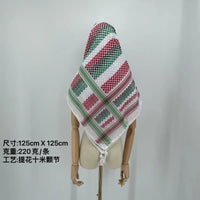What is the Difference Between a Pool Towel and a Beach Towel?
When planning a sunny day by the water, whether at the pool or the beach, having the right towel can make a significant difference in your comfort and experience. While pool towels and beach towels may seem similar at first glance, they are designed with specific features and purposes that set them apart. In this article, we will explore the differences between a pool towel and a beach towel, helping you make an informed choice for your next aquatic adventure.
Size Matters: Pool Towel vs. Beach Towel
One of the most noticeable differences between pool towels and beach towels is their size. Beach towels are typically larger and longer than pool towels. This extra length and width make beach towels ideal for lying on the sand or using as a makeshift blanket. A standard beach towel can measure up to 36 × 68 inches, providing ample space for lounging and sunbathing.
In contrast, pool towels are designed to be more compact and easier to carry. They are usually smaller, with dimensions ranging from 24 × 46 to 24 × 48 inches. The smaller size of pool towels makes them perfect for quickly drying off after a swim and for easy storage in your poolside bag.
Material and Fabric: Comfort and Functionality
The material and fabric of pool towels and beach towels also differ significantly. Beach towels are often made from thicker, more absorbent materials like terry cloth. This thickness helps beach towels handle sand, salt, and moisture more effectively, making them perfect for the beach environment. Additionally, beach towels are designed to be resilient, withstanding the rough conditions of the beach, including exposure to sand, sunscreen, and food stains.
On the other hand, pool towels are typically made from 100% cotton or poly-cotton blends. These materials are chosen for their ability to dry quickly and provide a soft, plush feel against the skin. Pool towels are designed to be water-resistant, meaning they can handle frequent contact with water without fading or losing their quality. This makes them ideal for use around the pool, where quick drying and durability are essential.

Design and Aesthetics: Style and Practicality
When it comes to design, beach towels and pool towels also have distinct differences. Beach towels often feature bold, colorful designs, such as stripes, florals, and tropical prints. These eye-catching patterns not only add a touch of style to your beach day but also make it easier to spot your towel among the crowd.
Pool towels, on the other hand, tend to have more subdued designs, featuring solid colors or simple patterns. This simplicity makes them versatile and suitable for various settings, from poolside lounging to use in spas and hotels.
Another key design difference is that beach towels usually have two distinct sides. One side is non-absorbent and sand-repellent, designed to stay clean and dry even when lying on the sand. The other side is more absorbent, perfect for drying off after a swim. Pool towels, however, are typically uniform on both sides, focusing on quick drying and comfort.
Resistance and Resilience: Durability in Different Environments
Beach towels are designed to be resilient, able to withstand the harsh conditions of the beach. They are made to handle exposure to sand, saltwater, sunscreen, and food stains. This resilience ensures that your beach towel remains in good condition even after multiple beach trips.
Pool towels, in contrast, are built to be water-resistant. They are designed to handle frequent contact with chlorinated pool water without fading or deteriorating. High-quality pool towels are also resistant to sunlight, preventing color changes and maintaining their vibrant appearance over time.

Practical Uses: Choosing the Right Towel for the Occasion
When deciding between a pool towel and a beach towel, it's essential to consider your intended use. If you plan to spend the day at the beach, a larger beach towel is likely the better choice. The extra size provides more coverage and comfort when lying on the sand, and the dual-sided design ensures you stay dry and sand-free.
For poolside activities, a smaller, more compact pool towel is more appropriate. Its quick-drying properties and plush feel make it perfect for drying off after a swim and lounging by the pool. Additionally, pool towels are easier to carry and store, making them a convenient choice for poolside use.
Conclusion: Making the Right Choice for Your Needs
In summary, the main differences between a pool towel and a beach towel lie in their size, material, design, and intended use. Beach towels are larger, more absorbent, and designed to handle the sandy, salty environment of the beach. Pool towels, on the other hand, are smaller, quick-drying, and water-resistant, making them ideal for use around the pool.
When choosing between the two, consider your specific needs and preferences. Whether you're planning a relaxing day at the beach or a fun-filled afternoon by the pool, having the right towel can enhance your experience and provide the comfort and convenience you need.





